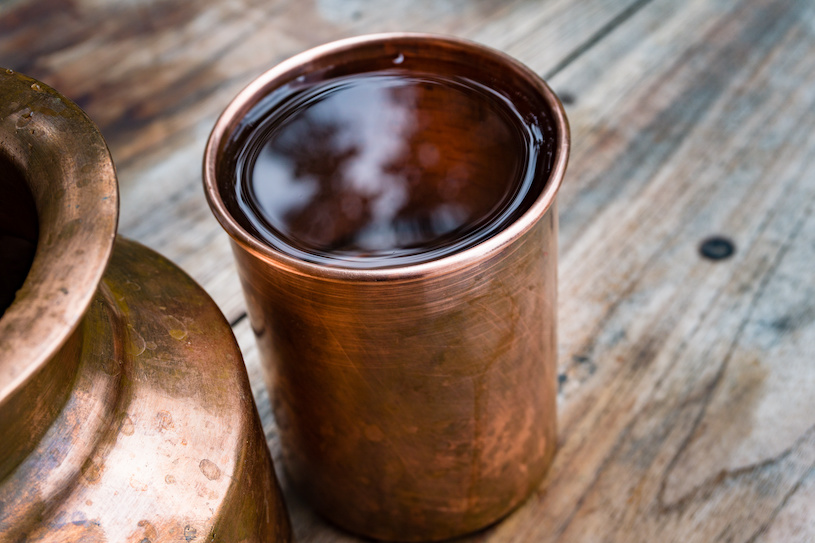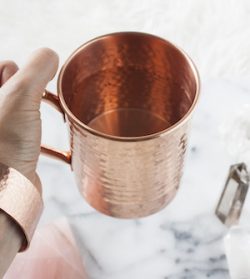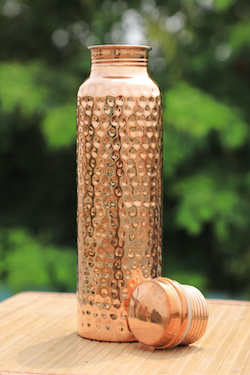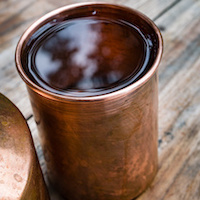Copper Immunity By Chahna Tailor

In a few of my previous articles, I have mentioned that copper is highly beneficial. I’ve suggested using a copper tongue scraper and drinking from a copper cup.
But why?
Acharya Charaka, author of Charaka Samhita, wrote about many metals that are beneficial to the body. There are two ways to get these metals into your body: by utilizing utensils made from these metals or directly through food. In pre-Vedic times, copper, silver, and gold were often incorporated in daily routines and rituals.
Charaka Samhita states that copper can be used for rejuvenation, hiccups, respiratory distress, poison, skin disorders, abscesses, and even eye disorders. Some simple ways to introduce copper is by using copper utensils such as tongue scrapers, cups/containers, or even as an enema nozzle.
Copper is said to play a strong role in purifying drinking water because of its ability to eradicate microbes that can be fatal to our body. Current science is also supporting these findings. In the old days, it was a common practice to leave a copper tumbler filled with water at the bedside, so that the water can be consumed immediately upon waking up. This was a way to remove toxins from the body. My uncle’s father, until his very last day, purified his water in a copper lota, drank from a silver cup, and ate with a silver spoon. He lived a very long life!
 Copper is also known to be one of the elements that can help the body produce red blood cells as well as contribute to the absorption of iron. Bill Keevil of the University of Southampton, United Kingdom, performed a live experiment where he placed MRSA (staphylococcus aureus) bacteria on a copper surface and demonstrated how the bacteria died immediately. On the other hand, the same bacteria lived for weeks when placed on a stainless steel surface (Telegraph India).
Copper is also known to be one of the elements that can help the body produce red blood cells as well as contribute to the absorption of iron. Bill Keevil of the University of Southampton, United Kingdom, performed a live experiment where he placed MRSA (staphylococcus aureus) bacteria on a copper surface and demonstrated how the bacteria died immediately. On the other hand, the same bacteria lived for weeks when placed on a stainless steel surface (Telegraph India).
These days, we use glass to hold our water and stainless steel for our tongue cleaners. When it comes to a tongue cleaner specifically, Charaka Samhita mentions it “should be made of gold, silver, copper, tin, or brass, and should be non-sharp and curved, so as not to injure the tongue.” If current science is also supporting that stainless steel allows bacteria to live on its surface, is it a good idea to use it for something we use every day (sometimes twice a day) in our mouths?
In case a copper tumbler or copper tongue scraper is not readily available or you simply cannot incorporate them in your daily routine, certain foods can also be a great source. For example, foods such as spirulina, shiitake mushrooms, almonds, cashews, sesame seeds, spinach, kale, swiss chard, and even dark chocolate are a rich source of copper.
Ayurveda is said to be endless, ananta; our Vedic history is filled with such rich knowledge. Just a simple switch of adding some copper tools into your daily routine can provide you with some healthy benefits. So, what do you think? Ready to incorporate it?
 About the Author
About the Author
Chahna Tailor, a certified yoga instructor, has a background in occupational therapy and health science & administration. Chahna deepened her yoga practice by training in Rishikesh, India, where she studied the science behind yoga as a whole. Chahna provides yoga, pranayama, and meditation services through her company Namaskar To You. A volunteer for Ekal Vidyalaya, Chahna also Registered Yoga Teacher with Yoga Alliance. She is currently pursuing a doctoral degree in Ayurvedic Medicine while continuing her self-studies in yoga.























